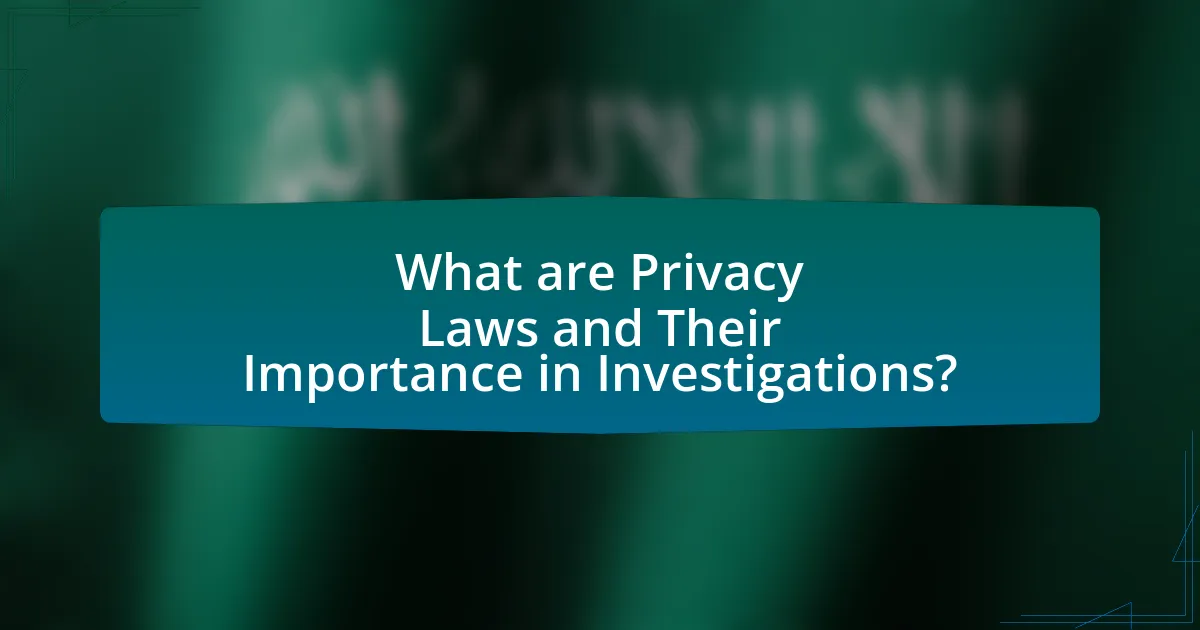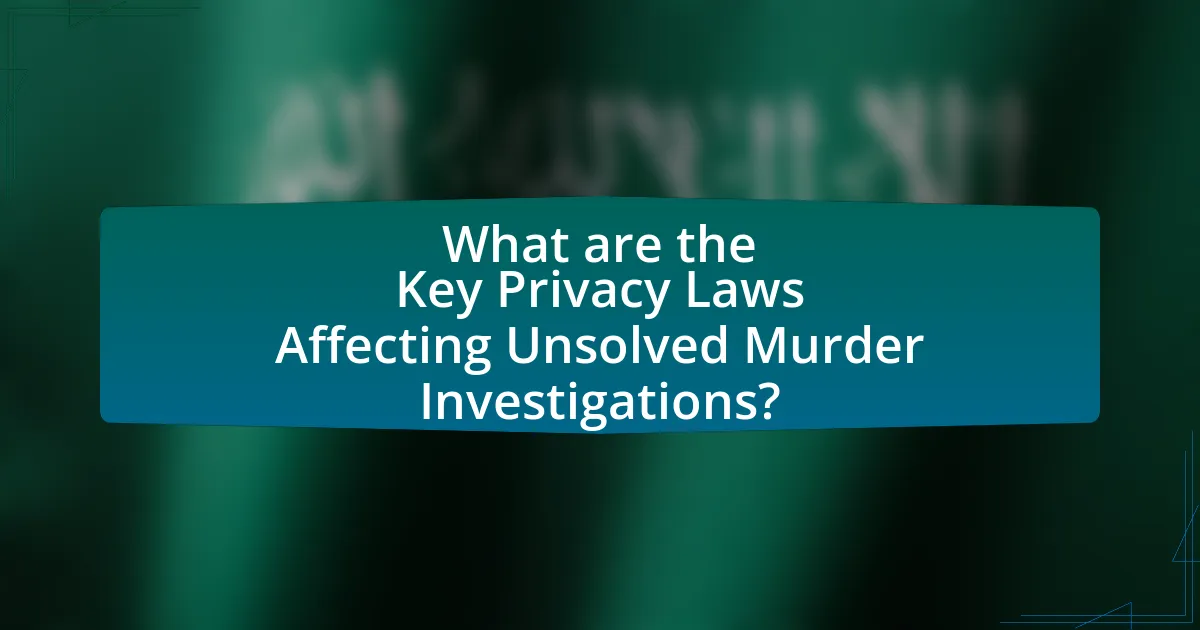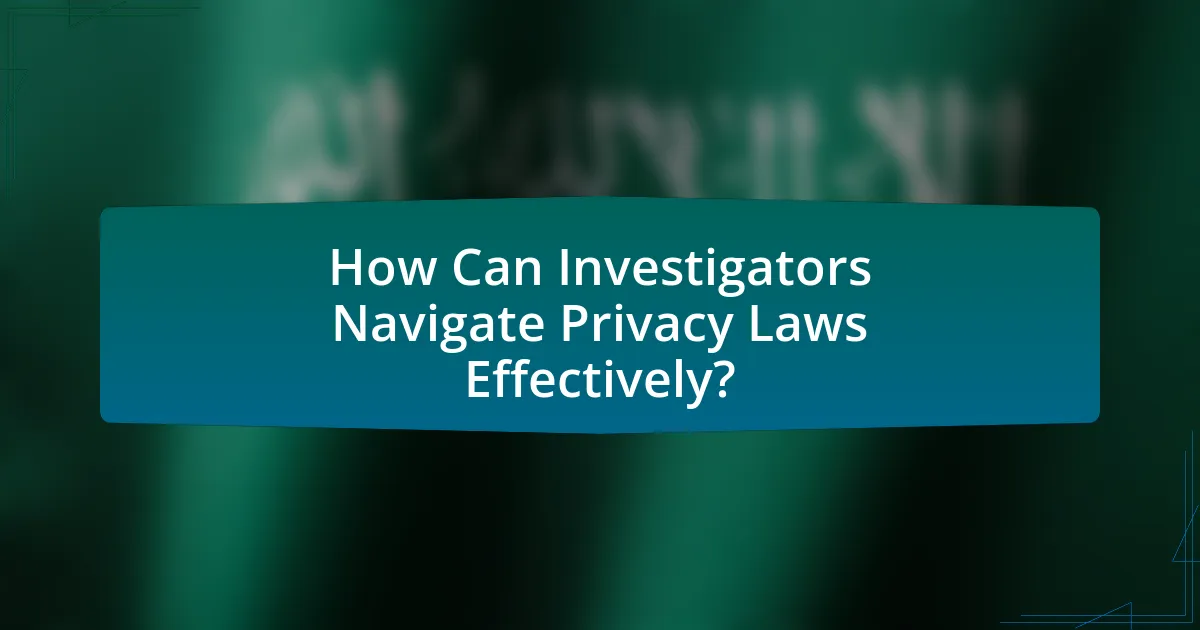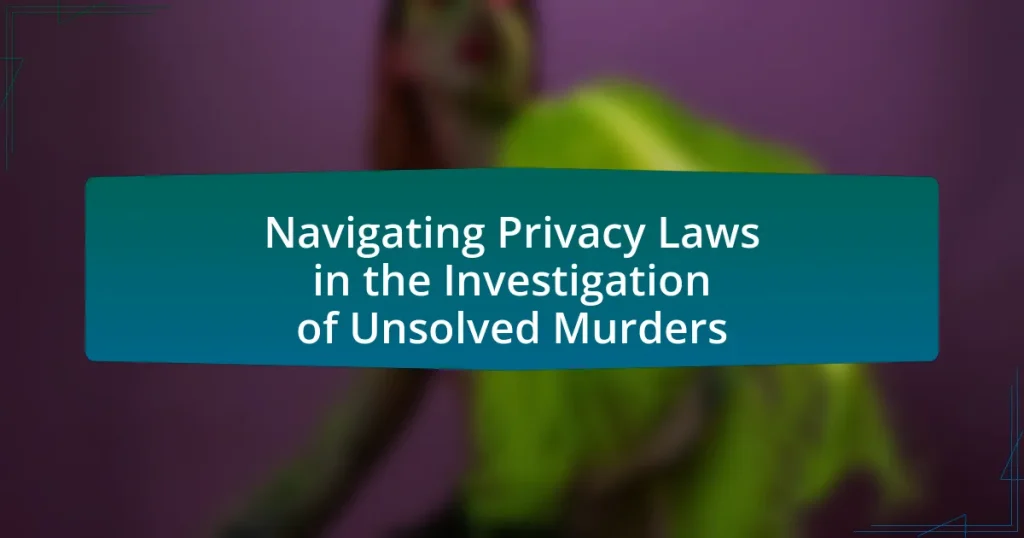The article focuses on the critical role of privacy laws in the investigation of unsolved murders, highlighting how these regulations govern the collection and use of personal information while protecting individual rights. It examines specific laws such as the Fourth Amendment, HIPAA, and state privacy statutes, detailing their impact on law enforcement’s ability to gather evidence. The discussion includes the challenges faced by investigators in balancing public safety with privacy rights, strategies for compliance, and best practices for handling sensitive information. Overall, the article underscores the importance of understanding privacy laws to ensure effective and lawful investigations.

What are Privacy Laws and Their Importance in Investigations?
Privacy laws are regulations that govern the collection, use, and dissemination of personal information, ensuring individuals’ rights to control their data. These laws are crucial in investigations, particularly in sensitive cases like unsolved murders, as they protect the privacy of victims, witnesses, and suspects while balancing the need for law enforcement to gather evidence. For instance, the General Data Protection Regulation (GDPR) in Europe mandates strict guidelines on personal data handling, which can impact how investigators access information. Violating these laws can lead to legal repercussions and hinder investigations, emphasizing the importance of compliance in the pursuit of justice.
How do privacy laws impact the investigation of unsolved murders?
Privacy laws significantly restrict the access law enforcement has to personal information during the investigation of unsolved murders. These laws, such as the Health Insurance Portability and Accountability Act (HIPAA) and various state privacy statutes, limit the sharing of sensitive data, which can hinder the collection of crucial evidence. For instance, if investigators require medical records or communication data to identify potential witnesses or suspects, privacy regulations may prevent them from obtaining this information without proper consent or a warrant. Consequently, these legal barriers can delay or obstruct the resolution of cases, making it more challenging to solve murders that remain unsolved.
What specific privacy laws are relevant to criminal investigations?
The specific privacy laws relevant to criminal investigations include the Fourth Amendment of the U.S. Constitution, which protects against unreasonable searches and seizures, and the Electronic Communications Privacy Act (ECPA), which governs the interception and disclosure of electronic communications. Additionally, the Health Insurance Portability and Accountability Act (HIPAA) may apply when investigating cases involving medical records. These laws establish the legal framework that law enforcement must navigate to ensure that investigations respect individuals’ privacy rights while gathering necessary evidence.
How do these laws protect individuals’ rights during investigations?
Laws protecting individuals’ rights during investigations ensure that personal privacy is respected and that due process is followed. These laws, such as the Fourth Amendment in the United States, prohibit unreasonable searches and seizures, requiring law enforcement to obtain warrants based on probable cause. Additionally, statutes like the Privacy Act safeguard personal information from unauthorized disclosure, ensuring that individuals are informed about how their data is used. These protections are crucial in maintaining the balance between effective law enforcement and the rights of individuals, as they prevent arbitrary actions by authorities and promote accountability.
Why is understanding privacy laws crucial for law enforcement?
Understanding privacy laws is crucial for law enforcement because these laws dictate the boundaries within which police can operate during investigations. Compliance with privacy regulations ensures that law enforcement agencies respect individuals’ rights while gathering evidence, which is essential for maintaining public trust and upholding the integrity of the legal process. For instance, the Fourth Amendment of the U.S. Constitution protects citizens against unreasonable searches and seizures, requiring law enforcement to obtain warrants based on probable cause. Failure to adhere to these laws can result in evidence being deemed inadmissible in court, jeopardizing cases and potentially allowing guilty parties to evade justice.
What challenges do law enforcement agencies face regarding privacy laws?
Law enforcement agencies face significant challenges regarding privacy laws, primarily due to the need to balance public safety with individual rights. These agencies often encounter restrictions on data collection and surveillance practices, which can hinder their ability to gather crucial evidence in investigations. For instance, the Fourth Amendment protects citizens against unreasonable searches and seizures, requiring law enforcement to obtain warrants based on probable cause before accessing personal information. Additionally, varying state and federal privacy regulations complicate compliance, as agencies must navigate a complex legal landscape that can differ significantly across jurisdictions. This complexity can lead to delays in investigations and potential legal repercussions if privacy laws are inadvertently violated.
How can law enforcement balance privacy rights with the need for investigation?
Law enforcement can balance privacy rights with the need for investigation by implementing targeted surveillance measures that comply with legal standards. This approach ensures that investigations are conducted within the framework of constitutional protections, such as obtaining warrants based on probable cause. For instance, the Fourth Amendment of the U.S. Constitution protects citizens from unreasonable searches and seizures, requiring law enforcement to justify their actions legally. Additionally, law enforcement agencies can utilize data minimization techniques, collecting only the information necessary for the investigation, thereby respecting individual privacy while still pursuing leads. This balance is further supported by judicial oversight, which can provide checks on law enforcement practices to ensure adherence to privacy laws.

What are the Key Privacy Laws Affecting Unsolved Murder Investigations?
Key privacy laws affecting unsolved murder investigations include the Health Insurance Portability and Accountability Act (HIPAA), the Family Educational Rights and Privacy Act (FERPA), and various state privacy laws. HIPAA restricts the disclosure of medical records, which can be crucial in investigations, while FERPA protects student education records, potentially limiting access to information from schools. Additionally, state privacy laws vary but often govern the handling of personal data, impacting how law enforcement can collect and use information during investigations. These laws create a framework that balances the need for public safety with individual privacy rights, complicating the investigative process.
What is the role of the Fourth Amendment in criminal investigations?
The Fourth Amendment plays a critical role in criminal investigations by protecting individuals from unreasonable searches and seizures. This constitutional provision requires law enforcement to obtain a warrant based on probable cause before conducting searches or seizing property, thereby safeguarding citizens’ privacy rights. The amendment’s enforcement is crucial in ensuring that evidence collected during investigations is admissible in court, as any evidence obtained in violation of the Fourth Amendment may be excluded under the exclusionary rule. This principle is supported by landmark Supreme Court cases, such as Mapp v. Ohio (1961), which established that evidence obtained unlawfully cannot be used in state courts, reinforcing the importance of the Fourth Amendment in maintaining lawful investigative practices.
How does the Fourth Amendment protect against unreasonable searches?
The Fourth Amendment protects against unreasonable searches by requiring law enforcement to obtain a warrant based on probable cause before conducting searches or seizures. This constitutional provision establishes a legal framework that safeguards individuals’ privacy rights, ensuring that searches are not arbitrary or conducted without sufficient justification. Historical context shows that the amendment was ratified in 1791 in response to abuses by British authorities, emphasizing the importance of protecting citizens from invasive government actions. Courts have interpreted this amendment to mean that evidence obtained through unreasonable searches is inadmissible in court, reinforcing the principle that individuals have a right to privacy in their persons, houses, papers, and effects.
What exceptions exist to the Fourth Amendment protections?
Exceptions to the Fourth Amendment protections include the exigent circumstances exception, consent, plain view doctrine, and searches incident to lawful arrest. Exigent circumstances allow law enforcement to enter a property without a warrant if there is an immediate need to prevent harm, destruction of evidence, or escape of a suspect. Consent occurs when an individual voluntarily agrees to a search, waiving their Fourth Amendment rights. The plain view doctrine permits officers to seize evidence without a warrant if it is clearly visible during a lawful observation. Searches incident to lawful arrest allow officers to search a person and their immediate surroundings without a warrant to ensure officer safety and prevent evidence destruction. These exceptions are established through various court rulings, including cases like Kentucky v. King and Illinois v. Gates, which clarify the legal standards for each exception.
How do state privacy laws vary in relation to murder investigations?
State privacy laws vary significantly in relation to murder investigations, with some states allowing broader access to personal information for investigative purposes while others impose stricter limitations. For instance, California’s privacy laws provide law enforcement with access to certain personal data during investigations, but they also require a warrant for electronic communications, whereas Texas has fewer restrictions, allowing law enforcement to obtain information without a warrant in specific circumstances. This variation is influenced by each state’s legislative framework, public sentiment regarding privacy, and the balance between individual rights and public safety.
What are common state-specific privacy regulations that affect investigations?
Common state-specific privacy regulations that affect investigations include the California Consumer Privacy Act (CCPA), which grants individuals rights over their personal data and imposes restrictions on data collection and sharing. Additionally, the Health Insurance Portability and Accountability Act (HIPAA) regulates the use of medical records, impacting investigations that require access to health information. Furthermore, various states have enacted laws that protect the privacy of electronic communications, such as the Electronic Communications Privacy Act (ECPA), which governs the interception and disclosure of electronic communications. These regulations can limit the ability of investigators to access personal information, thereby influencing the course of investigations into unsolved murders.
How do these state laws interact with federal privacy laws?
State laws often complement or expand upon federal privacy laws, creating a complex legal landscape for privacy protection. For instance, while federal laws like the Health Insurance Portability and Accountability Act (HIPAA) set baseline privacy standards for health information, state laws can impose stricter regulations, such as requiring additional consent for data sharing. This interaction means that investigators must navigate both layers of regulation, ensuring compliance with both state-specific requirements and overarching federal mandates. The interplay can lead to variations in how personal data is handled in investigations, emphasizing the need for thorough legal understanding in the context of unsolved murder cases.

How Can Investigators Navigate Privacy Laws Effectively?
Investigators can navigate privacy laws effectively by understanding the specific regulations that govern data collection and usage in their jurisdiction. Familiarity with laws such as the General Data Protection Regulation (GDPR) in Europe or the Health Insurance Portability and Accountability Act (HIPAA) in the United States is crucial, as these laws dictate how personal information can be accessed and shared. For instance, GDPR mandates that personal data must be processed lawfully, transparently, and for specific purposes, which requires investigators to obtain consent or demonstrate a legitimate interest in the data they seek. Additionally, engaging legal counsel can provide clarity on compliance and help mitigate risks associated with privacy violations. This approach ensures that investigators respect individuals’ rights while effectively gathering necessary information for their cases.
What strategies can investigators use to comply with privacy laws?
Investigators can comply with privacy laws by implementing strategies such as obtaining informed consent, anonymizing data, and adhering to legal frameworks like the General Data Protection Regulation (GDPR). Informed consent ensures that individuals are aware of how their information will be used, which is a fundamental requirement under privacy laws. Anonymizing data protects personal identifiers, thereby reducing the risk of privacy breaches. Additionally, following established legal frameworks, such as GDPR, provides a structured approach to data handling, ensuring that investigators respect individuals’ rights while conducting their inquiries. These strategies are essential for maintaining legal compliance and protecting the privacy of individuals involved in investigations.
How can investigators obtain necessary information while respecting privacy?
Investigators can obtain necessary information while respecting privacy by utilizing legal frameworks such as subpoenas and search warrants, which ensure compliance with privacy laws. These legal tools allow investigators to access relevant data from third parties, such as phone records or financial information, while adhering to established legal standards that protect individual privacy rights. For instance, the Fourth Amendment of the U.S. Constitution protects against unreasonable searches and seizures, requiring law enforcement to demonstrate probable cause before obtaining a warrant. This process not only safeguards personal privacy but also ensures that the information gathered is admissible in court, thereby maintaining the integrity of the investigation.
What role does consent play in gathering evidence?
Consent is crucial in gathering evidence as it ensures that the rights of individuals are respected and that the evidence collected is legally admissible. Without obtaining consent, investigators may violate privacy laws, leading to potential legal challenges that could render the evidence inadmissible in court. For instance, the Fourth Amendment of the U.S. Constitution protects against unreasonable searches and seizures, emphasizing the necessity of consent in many investigative scenarios. Additionally, ethical guidelines in law enforcement mandate that consent be obtained to maintain public trust and uphold the integrity of the investigation.
What are the best practices for law enforcement in handling sensitive information?
Best practices for law enforcement in handling sensitive information include implementing strict access controls, ensuring data encryption, conducting regular training on privacy laws, and maintaining clear documentation of information handling procedures. Access controls limit who can view sensitive data, thereby reducing the risk of unauthorized access. Data encryption protects information during storage and transmission, making it unreadable to unauthorized users. Regular training ensures that personnel are aware of current privacy laws and best practices, which is crucial given the evolving legal landscape. Documentation of procedures provides a clear framework for compliance and accountability, which is essential in investigations involving unsolved murders where privacy concerns are heightened.
How can law enforcement ensure transparency while protecting privacy?
Law enforcement can ensure transparency while protecting privacy by implementing clear policies that govern the release of information and utilizing technology that anonymizes data. These policies should outline what information can be shared with the public, ensuring that sensitive personal data is not disclosed. For instance, the use of redaction techniques in public records can allow for the dissemination of relevant case details without compromising individual privacy. Additionally, law enforcement agencies can engage in community outreach to explain their processes and decisions, fostering trust while maintaining confidentiality. Studies have shown that transparency initiatives, such as public reporting on crime statistics and investigation outcomes, can enhance public confidence without infringing on privacy rights.
What training is necessary for investigators regarding privacy laws?
Investigators require comprehensive training on federal and state privacy laws, including the Health Insurance Portability and Accountability Act (HIPAA), the Family Educational Rights and Privacy Act (FERPA), and the General Data Protection Regulation (GDPR) if applicable. This training ensures that investigators understand the legal boundaries of data collection, storage, and sharing, particularly when handling sensitive information related to unsolved murders. For instance, knowledge of HIPAA is crucial when accessing medical records, while FERPA governs the privacy of student education records. Such training is essential to prevent legal repercussions and to uphold the rights of individuals involved in investigations.
What practical tips can help investigators navigate privacy laws in unsolved murder cases?
Investigators can navigate privacy laws in unsolved murder cases by understanding the specific legal frameworks governing privacy, obtaining necessary warrants, and ensuring compliance with data protection regulations. Familiarity with laws such as the Health Insurance Portability and Accountability Act (HIPAA) and the Family Educational Rights and Privacy Act (FERPA) is crucial, as these laws dictate how personal information can be accessed and shared. Additionally, obtaining warrants allows investigators to legally access private records, while adhering to state and federal guidelines ensures that the investigation remains within legal boundaries. These practices help maintain the integrity of the investigation while respecting individuals’ privacy rights.


